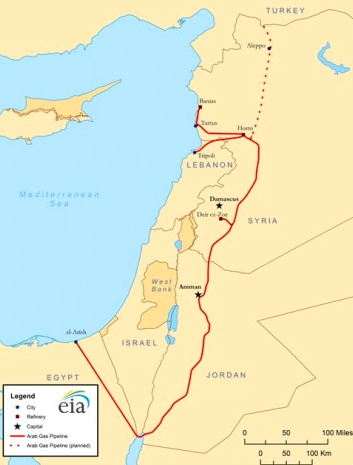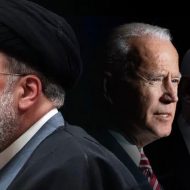The Syrian Arab Republic is step-by-step returning to the diplomatic theater of the Middle East. Following the military victory over main parts of the armed groups, ceasefire agreements with the remaining within the Astana process and after the presidential elections in May 2021, won by current President Bashar al Assad, the Syrian government has established undisputed control over main parts the country, except parts in the north and East of the Euphrates.
The establishment of undisputed control and authority is accompanied by accelerated diplomatic contacts of Syria with neighboring countries.
Syria – Egypt: foreign ministers meet the first time since 10 years
The latest development in Syria’s diplomatic reintegration into the Arab World took place in New York during the UN General Assembly, when the Egyptian and Syrian foreign ministers met.
Although the Egyptian government established after Mohammed Morsi’s fall had announced its support for Syria various times, with President Al Sisi even stating “support for Syria’s military” in the midst of ongoing clashes in 2016, the recent meeting was the first official encounter since 10 years.
The meeting was the first of its kind since freezing the Syria’s membership in the Arab League in 2011. Moreover, it reflects a warming of relations between Damascus and Cairo that includes concrete steps – and third Arab countries.
Lebanon – Syria: Beirut sends government delegation to Damascus, leading to multilateral agreement
On September 4, the Lebanese government sent a delegation to Damascus – the “highest level visit since years” as Al Jazeera observed.
The delegation was headed by Zeina Akar, deputy prime minister and defense minister and included Finance Minister Ghazi Wazni, Energy Minister Raymond Ghajar and General Security agency chief Abbas Ibrahim.
Background of the visit was the energy crisis, which Lebanon is going through, and a proposal to solve it through gas exports from Egypt via Jordan and Syria to Beirut.
The idea was to reactivate the Arab Gas Pipeline that starts from Egypt, passes through Jordan and Syria and ends in Lebanon. The gas transmission through the pipeline had been halted in 2011 following Mubarak’s fall from power in Egypt.

Shortly after the Lebanese delegation’s visit, another meeting took place between Jordanian Minister of Energy and Mineral Resources Hala Zawati, Egyptian Minister of Petroleum and Mineral Resources Tarek El Molla, Syrian Minister of Oil and Mineral Resources Bassam Tohme, and the outgoing Lebanese Minister of Energy and Water Dr. Raymond Ghajar on September 9 in Jordan.
The Jordanian minister for energy and the Egyptian minister for energy confirmed the agreement, where now a plan of action and a timetable is being developed now.
The Egyptian state-owned gas company already informed its partners – Shell and Petronas – that LNG supplies intended to Lebanon would be halted “with immediate effect”, reported the Journal of Petroleum Technology.
A break-through of US sanctions on Syria
The journal as well as international media emphasized that the gas agreement constituted a violation of existing US sanctions on Syria, which prohibit transactions with the Syrian government and had locked earlier attempts to deliver Egyptian gas to Lebanon because of the passage through Syria.
A US senator visiting Lebanon beginning September, Chris Van Hollen, stated to Reuters “The complication as you know is the transport via Syria. We are (urgently) looking for ways to address that despite the Caesar act”, in reference to US sanctions.
The Lebanese Hezbollah meanwhile had also broken through US sanctions by delivering Iranian petroleum via Syria to Lebanon in September.
The Arab Weekly comments on the agreement: “For helping Lebanon with its electricity crisis, Washington will have to grant Assad some recognition and attention, a price the Biden administration seems willing to pay. The American plan will only marginally improve Lebanon’s electricity situation. How much it benefits Al-Assad is immeasurable.”
The German Deutsche Welle already asks: “Lebanon power deal: Beginning of the end of Syria’s isolation?”
Technical teams of Syria and Jordan have already started inspecting the existing pipeline, reports the Syrian news agency SANA.
Normalization with Jordan
But normalization with neighboring Jordan goes well beyond the agreement. Syria’s defense minister and the Jordanian army’s chief of staff came face to face in a rare meeting between the heads of the countries’ militaries on September 19.
The meeting comes after a Syrian military offensive in the town of Deraa, south of Damascus, an area of instability 13 kilometres north of the border with Jordan.
On September 28, Syrian-Jordanian ministerial meetings have been resumed in the Jordanian capital of Amman, to discuss means of enhancing bilateral cooperation between the two countries in the fields of trade, transport, electricity, agriculture, and water resources.
The same day, Jordanian Prime Minister Bishr al-Khasawneh stressed the importance of enhancing relations of cooperation and coordination between Jordan and Syria in various fields to serve the common interests of the two countries and brotherly peoples, reports SANA.
In parallel, Jordan announced to open fully its border to Syria, resume passenger flights from Amman to Damascus and lift restrictions on transit cargo heading to Syria.
All in all, Syria heads towards normalizing relations with neighbors in a fast speed. This will provide the country a new diplomatic and economical impetus to face the remaining major tasks on its soil: US occupation in the East, separatist and jihadist terror organizations and the tense relations with the main neighbor to the north, Turkey.
While Turkish President Erdoğan heads to a bilateral summit with Russian President Putin on September 29 in Sochi, where Syria and specifically the situation in Idlib will be on the agenda, it is a question how long Turkey can continue to reject reestablishing diplomatic relations with its southern neighbor.
In terms of diplomatic arms wrestling, Damascus is currently gaining strength. Whether the new Arab recognition of and for Syria is used to Ankara’s advantage or against it depends mainly on the Turkish government.









Leave a Reply